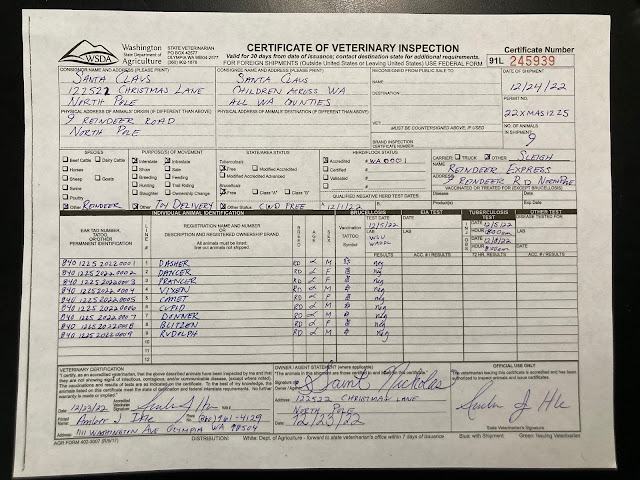Dr. Amber Itle
Washington State Veterinarian
 |
Photo courtesy of Ed
and Sonya Benhardt |
Holly is also
in charge of making sure all the reindeer health requirements are met before
flying around the world. While planning for Santa’s stops in the United
States, she checked InterstateLivestock.com
to see what each State requires. All the reindeer that cross state lines
must meet Washington
State import requirements, including a Certificate
of Veterinary Inspection (CVI) issued by an accredited veterinarian and a
permit number to move between states for toy delivery. A CVI is a special
animal health document that certifies that the animals listed “are not showing
signs of infectious, contagious and/or communicable diseases” and have met all
the required vaccinations and testing requirements. Santa’s reindeer tested
negative for tuberculosis, brucellosis, and meningeal worms and have maintained
“free” status in the CWD Herd Certification Program. Dasher, Dancer, Prancer,
Vixen, Comet, Cupid, Donner, Blitzen, and Rudolph all received clearance to fly
into Washington state.
Washington
State Veterinarian Dr. Amber Itle met with Holly to review his CVI paperwork
and Santa’s biosecurity
plans. Biosecurity plans are used to mitigate risk and limit exposure of
Santa’s reindeer to disease by implementing key practices. This is extremely
important since reindeer are susceptible to foot
and mouth disease, an economically devastating and most contagious disease
of cloven hooved animals. Biosecurity practices help to protect the reindeer
for disease and allow for business continuity at the North Pole. If Santa’s
reindeer get sick, they will not be able to deliver toys, which would have a
huge economic and emotional impact on children and parents
alike! Furthermore, Santa doesn’t want to be responsible for delivering an
animal disease along with toys when he traverses the world.
Santa’s
Top 10 Biosecurity Plan Tips
- No
visitors to the North Pole.
- Keep
a closed reindeer herd.
- Perform
annual laboratory testing for diseases of concern.
- Establish
a relationship with a veterinarian to oversee herd health and
vaccinations.
- Bring
your own reindeer grain, hay, and water for the journey.
- When
traveling, never land on the ground; rooftops are cleaner.
- Avoid
direct contact with wildlife, domestic animals, and humans.
- Clean
& disinfect your sleigh and boots between rooftops, states, countries
and when returning to the North Pole.
- Isolate
all reindeer returning from toy delivery for 30 days.
- Designate
elves to care for reindeer who have traveled.
Make sure to
track Santa and the reindeer’s flight path on December 24 using NORAD’s
Santa Tracker. Remember, if you are moving animals across
state lines this holiday season to check interstatelivestock.com
to meet the interstate animal movement requirements.
Have a safe
and happy holiday season from our end of the barn to yours.

